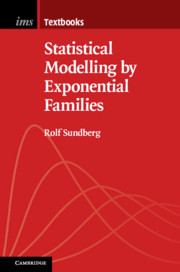Description
Statistical Modelling by Exponential Families
Institute of Mathematical Statistics Textbooks Series
Author: Sundberg Rolf
A readable, digestible introduction to essential theory and wealth of applications, with a vast set of examples and numerous exercises.
Language: English
Subject for Statistical Modelling by Exponential Families:
Approximative price 109.06 €
In Print (Delivery period: 14 days).
Add to cart
Statistical Modelling by Exponential Families
Publication date: 08-2019
296 p. · 15.7x23.5 cm · Hardback
Publication date: 08-2019
296 p. · 15.7x23.5 cm · Hardback
Statistical Modelling by Exponential Families
Publication date: 08-2019
296 p. · 15.2x22.8 cm · Paperback
Publication date: 08-2019
296 p. · 15.2x22.8 cm · Paperback
Description
/li>Contents
/li>Biography
/li>
This book is a readable, digestible introduction to exponential families, encompassing statistical models based on the most useful distributions in statistical theory, including the normal, gamma, binomial, Poisson, and negative binomial. Strongly motivated by applications, it presents the essential theory and then demonstrates the theory's practical potential by connecting it with developments in areas like item response analysis, social network models, conditional independence and latent variable structures, and point process models. Extensions to incomplete data models and generalized linear models are also included. In addition, the author gives a concise account of the philosophy of Per Martin-Löf in order to connect statistical modelling with ideas in statistical physics, including Boltzmann's law. Written for graduate students and researchers with a background in basic statistical inference, the book includes a vast set of examples demonstrating models for applications and exercises embedded within the text as well as at the ends of chapters.
1. What is an exponential family?; 2. Examples of exponential families; 3. Regularity conditions and basic properties; 4. Asymptotic properties of the MLE; 5. Testing model-reducing hypotheses; 6. Boltzmann's law in statistics; 7. Curved exponential families; 8. Extension to incomplete data; 9. Generalized linear models; 10. Graphical models for conditional independence structures; 11. Exponential family models for social networks; 12. Rasch models for item response and related models; 13. Models for processes in space or time; 14. More modelling exercises; Appendix A. Statistical concepts and principles; Appendix B. Useful mathematics.
Rolf Sundberg is Professor Emeritus of Statistical Science at Stockholms Universitet. His work embraces both theoretical and applied statistics, including principles of statistics, exponential families, regression, chemometrics, stereology, survey sampling inference, molecular biology, and paleoclimatology. In 2003, with M. Linder, he won the award for best theoretical paper in the Journal of Chemometrics for their work on multivariate calibration, and in 2017 he was named Statistician of the Year by the Swedish Statistical Society.
© 2024 LAVOISIER S.A.S.




